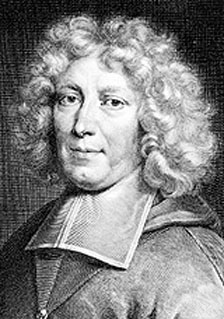| Pierre-Daniel Huet  Born: 8-Feb-1630 Born: 8-Feb-1630
Birthplace: Caen, France
Died: 26-Jan-1721
Location of death: Paris, France
Cause of death: unspecified
Gender: Male
Religion: Roman Catholic
Race or Ethnicity: White
Occupation: Religion Nationality: France
Executive summary: Bishop of Avranches Bishop of Avranches, French scholar, born at Caen in 1630. He was educated at the Jesuit school of Caen, and also received lessons from the Protestant pastor, Samuel Bochart. At the age of twenty he was recognized as one of the most promising scholars of the time. He went in 1651 to Paris, where he formed a friendship with Gabriel Naudé, conservator of the Mazarin library. In the following year Samuel Bochart, being invited by Queen Christina to her court at Stockholm, took his friend Huet with him. This journey, in which he saw Leiden, Amsterdam and Copenhagen, as well as Stockholm, resulted chiefly in the discovery, in the Swedish royal library, of some fragments of Origen's Commentary on St. Matthew, which gave Huet the idea of editing Origen, a task he completed in 1668. He eventually quarrelled with his friend Bochart, who accused him of having suppressed a line in Origen in the Eucharistic controversy. In Paris he entered into close relations with Chapelain. During the famous dispute of Ancients and Moderns Huet took the side of the Ancients against Charles Perrault and Jean Desmarets. Among his friends at this period were Conrart and Pellisson. His taste for mathematics led him to the study of astronomy. He next turned his attention to anatomy, and, being himself shortsighted, devoted his inquiries mainly to the question of vision and the formation of the eye. In this pursuit he made more than 800 dissections. He then learned all that was then to be learned in chemistry, and wrote a Latin poem on salt. All this time he was no mere bookworm or recluse, but was haunting the salons of Mlle. de Scudéry and the studios of painters; nor did his scientific researches interfere with his classical studies, for during this time he was discussing with Bochart the origin of certain medals, and was learning Syriac and Arabic under the Jesuit Parvilliers. He also translated the pastorals of Longus, wrote a tale called Diane de Castro, and defended, in a treatise on the origin of romance, the reading of fiction. On being appointed assistant tutor to the Dauphin in 1670, he edited with the assistance of Anne Lefèvre, afterwards Madame Dacier, the well-known edition of the Delphi Classics. This series was a comprehensive edition of the Latin classics in about sixty volumes, and each work was accompanied by a Latin commentary, ordo verborum, and verbal index. The original volumes have each an engraving of Arion and the Dolphin, and the appropriate inscription in usum serenissimi Delphini. Huet was admitted to the Academy in 1674. He issued one of his greatest works, the Demonstratio evangelica, in 1679. He took holy orders in 1676, and two years later the king gave him the abbey of Aulnay, where he wrote his Questiones Aletuanae (Caen, 1690), his Censura philosophiae Cartesianae (Paris, 1689), his Nouveau mémoire pour servir à l'histoire du Cartésianisme (1692), and his discussion with Nicolas Boileau on the Sublime. In 1685 he was made bishop of Soissons, but after waiting for installation for four years he took the bishopric of Avranches instead. He exchanged the cares of his bishopric for what he thought would be the easier chair of the Abbey of Fontenay, but there he was vexed with continual lawsuits. At length he retired to the Jesuits' House in the Rue Saint Antoine at Paris, where he died in 1721. His great library and manuscripts, after being bequeathed to the Jesuits, were bought by the king for the royal library.
Roman Catholic Bishop Avranches
French Academy 1674
Requires Flash 7+ and Javascript.
Do you know something we don't?
Submit a correction or make a comment about this profile
Copyright ©2019 Soylent Communications
|